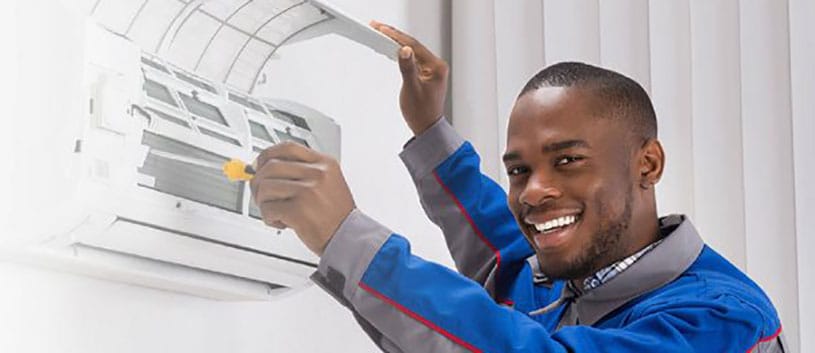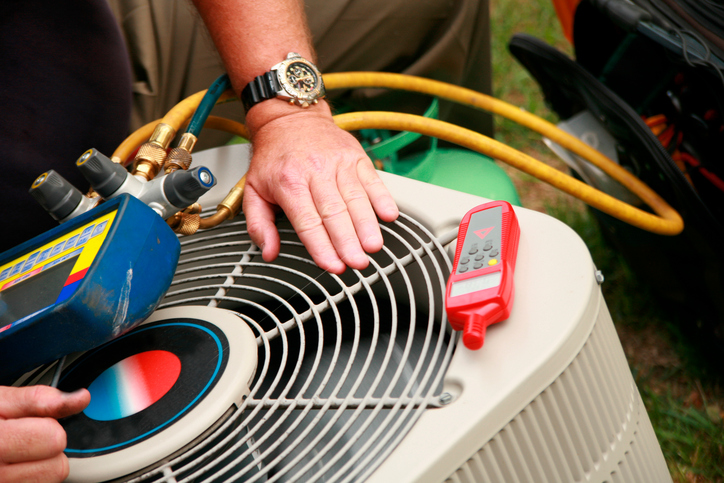Colorado is famous for its cold winters and various microclimates that persist throughout the year. While heating systems become an uncompromised necessity in winters, cooling systems are needed throughout summers and spring.
The varying climate creates an environment where HVAC technicians are in high demand. The local demand is met by various schools that offer HVAC degrees, courses, and certifications.
Aspiring HVAC technicians can greatly benefit from these schools. Out of the many different schools, this article lists some of the best ones to provide you with a detailed overview of what they have to offer.

How Long is HVAC School?
The duration of the HVAC school varies with the course taken by the students. Different courses have varying timelines. Some are full-time associate degrees that provide in-depth knowledge about the trade, while others are higher courses aimed for professionals to expand their knowledge.
An associate’s degree is usually a two-year-long full-time course. It includes both lectures and lab work. During the lectures, students are taught about the theoretical aspect of the degree. Students learn the designs, uses, and layouts, etc., of various tools and systems. The laboratories are workshop setups where students see a practical demonstration of what they’ve learned in the classrooms. Applicants must be at least 18 years of age when applying for admissions, which are available in community or trade schools and colleges.
Several short courses, both for beginners and professionals, are also arranged in HVAC schools from time to time. These are focused on a specific aspect or sub-field where professionals get to further polish their skills. Courses for beginners are usually introductory, and their duration varies with the expertise level and detail of the course outline. They usually last up to 15 weeks.
Apprenticeships allow technicians to work under professional setups after completion of their training. The duration varies from three to five years, depending upon the institute. After an apprenticeship, technicians must pass an exam for licensing before they can start work.

Photo credit: intellitec.edu
How Much Does HVAC School Cost?
Like the duration of HVAC schools, the cost also varies. The deciding factor is the timeline and course content of the course you wish to enroll in. A two-year associate’s degree, including theory and practical work, trains beginners and converts them into well-performing and skilled technicians. The cost ranges from $4,868 per year for in-state students and $8,614 per year for out-of-state students.
Non-degree or shorter courses can cost between $1,200 and $15,000 per course on average. The average course duration is six to 12 months. Courses involving complex and sophisticated machinery designed for professionals cost more than job-ready short-term courses for beginners that provide an introduction to the students of the HVAC trade.
Apprenticeships also vary in cost. Here, the institute acts as the main price-determining factor. Reputed firms, companies, and institutes give technicians a chance to learn from top-tier professionals and usually cost more while smaller companies have a smaller fee structure. The average range for apprenticeships lies between $500 and $2,000.
Quick Take - Best HVAC Schools in Colorado
Just looking for the top 3 schools in your area? Here are the best HVAC schools in Colorado:
List of the Top HVAC Schools in Colorado
Now that we know the basics about HVAC schools, the courses, and their fee structures, it is time to discuss schools that are good enough. In Colorado, there are plenty of schools where you can get your HVAC training. Some only offer degree courses, while others offer only short courses.
However, other schools cater to both beginners and professionals. This section takes a detailed look at some of the best HVAC Schools in Colorado.
Our Review of the Program
Spanning over 54 weeks, the HVAC course by Leonardi HVAC Training Center is one of the best of its kind. Two nights per week are taught so that those with a job or a busy schedule can easily manage part-time training. The course covers all the fundamentals that a beginner needs to be acquainted with before starting work as a technician, entering the HVAC trade, or NATE certification.
The instructor, Don Leonardi, is an experienced and skilled professional in the industry who provides excellent training to his students at a very competitive price. A state-of-the-art electric lab at this tech school is dedicated to providing hands-on training to the enrolled students.
A detailed overview of electric works associated with heating, cooling, and ventilation systems and appliances is provided, along with an insight into ACCA Manuals, codes, and crucial concepts like airflow and psychometrics. At the end of the course, technicians can identify issues and solve them very skillfully in HVAC systems.
Technicians who have had their training at the Leonardi HVAC training center have found very suitable jobs with various companies and contractors. They have excelled in the trade both as employees and as businessmen.
Our Review of the Program
This school provides a full-time degree and four certifications. The A.A.S in HVAC/R starts with the basics of HVAC concepts and progresses to get more technical. It is a 60 credit-hour degree where students learn HVAC systems used at residential, commercial, and industrial levels. Practical knowledge regarding electricity, electric components, tubing, piping, soldering, and controls are effectively delivered to students.
One of the best things about this degree is that it also focuses on interpersonal skills like communication, teamwork, and customer service, which will help students maintain a professional relationship with people in the trade. This degree is nationally accredited by PAHRA, which is the only accreditation supported by major industries.
Contents of the degree program are divided and taught separately as short-term certifications for those who need training in specific areas. Residential, commercial, and industrial HVAC systems and designs are taught under these courses and include thorough learning of codes, units, systems, and appliances used in each level.
At the end of the courses, technicians can safely handle all equipment and tools as well as troubleshoot problems and provide solutions. They are also able to perform general maintenance on HVAC systems and appliances. Along with that, a good command of communications with other people helps them excel professionally in the field.
Our Review of the Program
An industry-focused course at Pickens Technical College imparts entry-level residential skills to students. It uses modern technology to explain the designs and working of various heating and cooling systems before a practical demonstration is given in the workshops.
In the 270-hour-long course, students are familiarized with techniques like brazing and soldering, concepts of basic electricity, duct sizing, forced air gas furnace service, and hydronic service, etc. Technicians are specially trained to evaluate the running of the system after repair and maintenance through performance testing.
System design and working are efficiently conveyed to students via the Cengage Brain-Computer 3D animation programs using visual representation. This helps students get a good overview of the systems before they encounter them in a lab.
The internship program with Aurora Public Schools Maintenance Department and Cherry Creek School District is by far one of the most important perks of this course. This allows students to work alongside skilled technicians in a busy professional environment.
By the end of the course, students are allowed to earn their EPA certification, administered by the ESCO Institute. With the EPA certification, they are ready to compete with the outside market and earn well-paying spots at various firms and companies.
Our Review of the Program
For those looking forward to expanding their working knowledge on Green Technology, the diploma program at Lincoln Trade College is a great place to start. Students are not only trained to carry out the regular troubleshooting, repair, maintenance, and service tasks but are also introduced to newer technology in the field.
In 40 weeks, enrolled students attend 47 credit hours where they learn about climate control systems, electricity fundamentals, systems designs, and layouts. Besides, proper refrigerator recovery and recycling techniques are also taught.
Later in the course, Green Technology is introduced that works on the principles of energy efficiency and is different from conventional HVAC systems. Hands-on training in laboratories is provided at different stages of learning.
Once the diploma is complete, students are encouraged to take the EPA certification testing, too. Holders of the diploma can find jobs at various companies and firms as well as with independent contractors. Working knowledge of Green Technology gives them a competitive edge in the modern HVAC job market. They can also start their independent practice and are capable enough to lead teams and crews.
Our Review of the Program
The HVAC program at Emily Griffith Technical College is a nine-month-long full-time course. It equips students with all the necessary skills of the trade through theory and practical. In the 58.5 credit hours, students learn about HVAC systems, their electric layout, controls, troubleshooting, repair, and automation building.
After the course, technicians can easily detect problems, provide solutions, and repair heating and cooling systems, including heaters, water heaters, refrigerators, and air conditioners. Along with a staunch command of these basic tasks, technicians can efficiently utilize the acquired skills in piping, soldering, brazing, threading, PVC piping, and fabrication.
As the course ends, technicians also receive the EPA 608 certification. This allows them to start practice immediately under supervision or as independent technicians. They can find jobs not only as HVAC technicians but also as building engineers, maintenance technicians, service managers, temperature control technicians, and facilities managers, etc.
HVAC Schools in Colorado Comparison Table
| IMAGE | PRODUCT | |
|---|---|---|
 |
| Learn More →Read Customer Reviews |
 |
| Learn More →Read Customer Reviews |
 |
| Learn More →Read Customer Reviews |
 |
| Learn More →Read Customer Reviews |
 |
| Learn More →Read Customer Reviews |
What Makes Colorado a Great Place to Start an HVAC Career?
There are many reasons why Colorado would be a great place to start an HVAC career. It is a populous city with plenty of opportunities and a favorable climate that will suit HVAC technicians well. Here are a few reasons why you should consider building your career in Colorado.
Promising Potential
Colorado is among the top ten states for average median pay for HVAC technicians. While the national annual mean salary for the technicians is almost $51,420 in the USA, Colorado has an annual mean wage of $54,920. HVAC technicians make significantly more in Colorado than many other states in the USA.
Moreover, the demand for HVAC technicians is rising here. More than 8,000 jobs in the field of HVAC are projected to open in Colorado by 2026. It has the third-largest growth rate in this sector at 38%. Hence, the state provides promising prospects for HVAC technicians with plenty of opportunities and a handsome salary.

Photo credit: hvacschool.org
Changing Microclimates
The climatic conditions in Colorado keep on changing very rapidly. The area is famous for its microclimates. The varying temperatures make it essential to install robust HVAC systems and keep them running with regular maintenance and repairs. As a result, the demand for skilled HVAC technicians is ever-present. A certified technician can find work regularly and maintain an active career.
High Growth Cities
In Colorado, the population is rising, and development is increasing. While high-growth cities like Denver attract investment for residential and commercial buildings, the increase in population also translates into an increase in schools, retail stores, convention centers, etc.
All these buildings will require efficient HVAC systems, especially during the cold winters. All the installation, maintenance, and repair tasks will need HVAC technicians for completion, making a very nurturing environment for this trade.
Job Outlook and Salary For HVAC Techs in Colorado
The discussion above makes it quite clear that Colorado has very favorable prospects for HVAC technicians. It has a very good growth rate and pays technicians well too. However, for a deeper analysis of the situation, let’s look at how much technicians at different levels in their careers make annually.
Entry Level
Technicians with a working experience of less than a year are considered to be at the start of their career. Fresh out of their training, they retain a good amount of working knowledge about various aspects of the trade. They have a good employment rate as entry-level technicians at various companies and with working contractors.
On jobs like accompanying a senior technician or basic maintenance and repair, they can earn up to $15.74/hour, which totals to $32,730 a year. At this level, technicians can also find beginner-level jobs at companies involved in the supply and distribution of HVAC equipment.

Photo credit: rogersheatingandcooling.net
Mid-Level
With an experience of up to three or four years, a technician is considered to be working at mid-level in the field. At this point in the career, they can perform some complex repairs and diagnose problems with a lot of different systems.
They can find jobs where they are entrusted to overlook small groups or train beginners as well as get involved in residential, commercial, and industrial-level projects. The average salary at this level comes around to $24.94/hour approximately. Annually, they can earn up to $51,880.
Master-Level
The most experienced technicians in the field who work at the topmost level are considered to have achieved the master level. Usually, they have experience of more than ten years. Master-level technicians are consulted frequently for megaprojects at commercial and industrial levels. They are also well familiar with new technologies and innovative development in the HVAC field. Due to their high-level expertise, they earn up to $39.54/hour, which can total up to $82,234/year.

Photo credit: lincolntech.edu
Conclusion
With the changing climate, human dependence on HVAC systems is increasing; hence the work for HVAC technicians is booming. However, a technician must enter the field with staunch knowledge of the HVAC systems and processes. For this, good training involving both theoretical and practical knowledge is required.
Colorado has plenty of schools that provide excellent HVAC training under different courses to aspiring technicians. You can find a course suitable to your needs, interest, and timetable, no matter at what stage of your career you presently are. Moreover, Colorado provides a promising and growing working environment for HVAC technicians, making it a great place to start and even build your career.
Nearby HVAC Schools
Here are some HVAC schools in nearby states:





